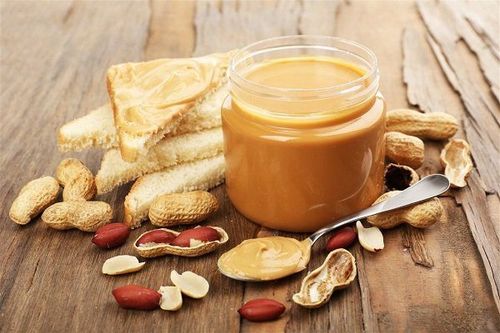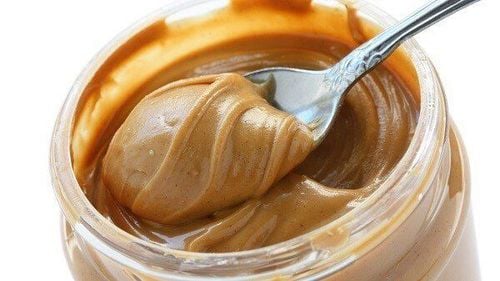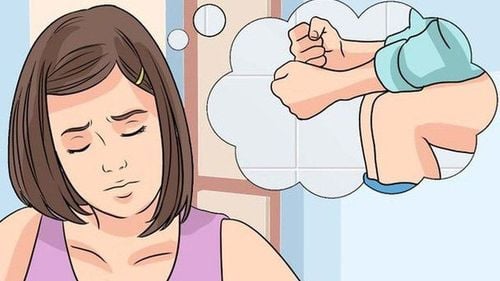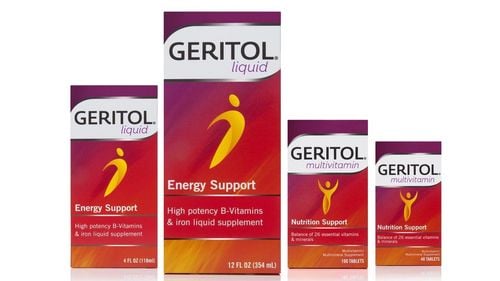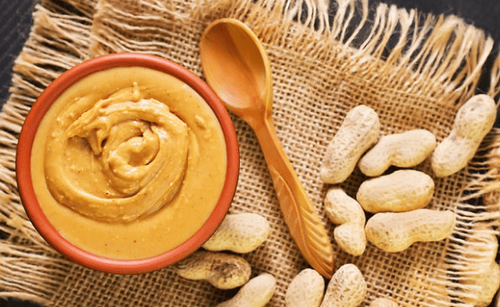This is an automatically translated article.
Peanut butter is one of the most popular butters in the world, with a good taste, simple texture. However, not everyone can use peanuts in their daily meals. Some people may experience an allergic reaction when using these products. But does peanut butter have any health benefits? This article will analyze this content in more depth.
1. Peanut butter
Peanut butter is a relatively unprocessed food. Basically, the main ingredient consists of peanuts, which are usually roasted and ground until they turn into a paste. However, this does not apply to many commercial brands of peanut butter that contain various additional ingredients included in the product, such as sugar, vegetable oils, or possibly trans fats. . Eating too much added sugar and trans fats has been linked to various health problems, such as heart disease.
Instead of buying junk food, choose real peanut butter as it should contain nothing but peanuts and maybe a little salt.
2. Peanut butter is a good source of protein
Is peanut butter good? Peanut butter will provide a fairly balanced source of energy including a full range of nutrients. Peanut butter ingredients in 100 grams include:
Carbohydrates: 20 grams of carbs (13% of calories), 6 of which are fiber. Protein: 25 grams of protein (15% of calories), the protein content in peanut butter is quite high compared to most other plant foods. Fat: 50 grams of fat, about 72% total calories. Although peanut butter is nutritionally rich in protein, peanut butter is low in the essential amino acid methionine.
Peanuts belong to the legume family, which also includes beans, peas and lentils. Legume proteins have much lower levels of the substances methionine and cysteine than animal proteins. For people who consume mostly plant-based proteins, methionine deficiency is a real risk. On the other hand, low methionine intake has also been hypothesized to have some health benefits. Studies have shown that peanut butter can prolong the life of rats and mice, but it is not clear whether the peanut butter ingredient works in the same way in humans.

Thành phần bơ đậu phộng cung cấp một lượng Protein nhất định
3. Peanut butter contains 20% carbs
Pure peanut butter contains only 20% carbs, so it is suitable for a low-carb diet, helps to reduce blood sugar very low and is a choice commonly applied to people with type 2 diabetes. Women who ate peanut butter five times a week or more had a 21% lower risk of type 2 diabetes. These benefits of peanut butter are partly due to oleic acid, one of the nutrients. the main fat in peanuts. Antioxidants may also play a role in this process.
4. Peanut butter is rich in healthy fats
Peanut butter is very rich in fat, in 100 grams contains a large amount of 588 calories. Although peanut butter is high in calories, eating moderate amounts of whole or whole peanut butter is perfectly fine in a weight loss diet.
Half of the fat in peanut butter is made up of oleic acid, a healthy monounsaturated fat also found in large amounts in olive oil. Oleic acid has been strongly linked to a number of health benefits, such as improved insulin sensitivity.
Peanut butter also contains some such as: Linoleic acid, an essential omega-6 fatty acid for the body's growth found in most vegetable oils.
Consuming a lot of fatty acids such as omega-6, which corresponds to omega-3, can increase inflammation and chronic disease risk.
5. Peanut butter is rich in vitamins and minerals
Peanut butter is quite nutritious. In 100 grams of peanut butter provides many vitamins and minerals:
Vitamin E: 45% RDA Vitamin B3 (Niacin): 67% RDA Vitamin B6: 27% RDA Folate: 18% RDA Magnesium: 39% RDA Copper: 24% RDA Manganese: 73% of the RDA The nutritional profile of peanut butter is also high in biotin and contains large amounts of vitamin B5, iron, potassium, zinc and selenium.
Please note, however, that for a 100-gram serving, there are a total of 588 calories. Peanut butter isn't as nutritious as low-calorie plant foods like spinach or broccoli.

Vitamin trong thành phần bơ đậu phộng bổ dưỡng cho người dùng
6. Antioxidant Rich Peanut Butter
Similar to other foods, peanut butter contains more than just basic vitamins and minerals. Peanut butter also contains many other bioactive nutrients, which may have a number of health benefits.
What is the effect of peanut butter? Peanut butter is rich in antioxidants such as p-coumaric acid, which can reduce arthritis in mice.
Peanut butter also contains some resveratrol, which has been linked to a reduced risk of heart disease and other chronic diseases in animals. The compound resveratrol has many other potential benefits to the body, although evidence in humans is limited.
7. Peanut butter is a potential source of aflatoxin
Although peanut butter is quite nutritious, peanut butter can also contain substances that can be harmful. At the top of this list will be aflatoxin. Peanuts grow underground, so they tend to be colonized by a common mold called aspergillus. The mold aspergillus belongs to the source of aflatoxin, which is highly carcinogenic.
Although humans are fairly resistant to the short-term effects of aflatoxin, what happens at this point is not fully known.
Several human studies have linked aflatoxin exposure to liver cancer, stunted children, and mental retardation. However, processing peanuts into peanut butter reduces aflatoxin levels by up to 89%. In addition, the USDA monitors the amount of aflatoxins in foods and ensures that they do not exceed recommended limits.
Peanut butter is quite nutritious and a rich source of protein. Peanut butter is also high in fiber, vitamins, and minerals, although this may seem insignificant when you consider the high calorie count. On the other hand, peanut butter provides a potential source of aflatoxin, which has been linked to long-term harm.
While you shouldn't use peanut butter as a main food source in your diet, you can occasionally eat it in small amounts. But the main problem with peanut butter is that it is so hard to resist.
If you only eat a small amount at a time, it probably won't do any harm. However, these symptoms may not stop. So, if you tend to be allergic to peanut butter, you should avoid this product altogether. Consuming peanut butter in moderation is unlikely to have any major negative effects as long as you're avoiding really terrible foods like sugary sodas, trans fats, and processed junk foods. other processing.
Please dial HOTLINE for more information or register for an appointment HERE. Download MyVinmec app to make appointments faster and to manage your bookings easily.
Reference sources: webmd.com, healthline.com



